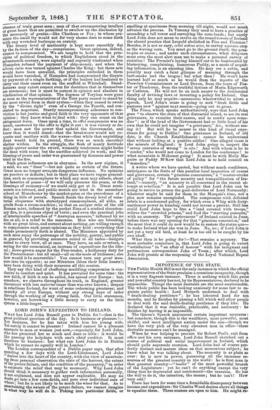LORD JOHN'S EXPEDITION TO IRELAND.
WHAT has Lord John Russell gone to Dublin for!—that is the great political question of the day. Is it business or pleasure ?— Not business, for he has taken with him his young wife. Yet surely it cannot be pleasure 1 Ireland cannot be a pleasant sPectacle to man or woman just now,—especially for Lord John, who has promised her so much and done so little : it would be use passing the holydays with one's chief creditor. It must therefore be business : but what can Lord John do in Dublin which he cannot do equally well in London ? The London correspondent of a Dublin paper says, that after spending a few days with the Lord-Lieutenant, Lord John 4 dashes into the heart of the country, with the view of ascertain- ing from personal observation the state of the harvest, the extent of the potato failure, and the condition of the peasantry," in order to estimate the relief that may be necessary. Why Lord John should think it necessary to gather such information personally, 15not explained, and does not appear explicable. He may no doubt go into a few corn-fields, and pore over individual ears of wheat ; but he is not likely to be much the wiser for that. As to ascertaining the extent of the potato failure, we cannot imagine in what, way he will do it. Poking into particular fields, or smelling at specimens from morning till night, would not much advance the process. In Tuscany they used to have a practice of ascending a tall tower and surveying the corn-lands ; but s Lord John does not mean to revive on the round towers of heti. the absurd practice that Leopold abolished in Pisa and Florence? Besides, it is not so easy, celsd sedens arce, to survey a potato crop as the waving corn. You must go to the ground itself, the pota- to-pits or stores ; and under such circumstances, what diligence must even the most alert man use to make a personal survey of statistics ! The Premier's laying himself out to be bamboozled by blarneying, complaining, humorous Paddy, as a mode of acquir- ing information, is an amusing idea. He may see a cabin, and possibly may catch a faint glimpse of meaning through the turf-smoke and the brogue ; but what then ? He won't have learned half so much as he would from the reports of the Poor-law Commissioners or Lord Devon, from the tours of Fos- ter or Thackeray, from the truthful fictions of Maria Edgeworth or Carleton. He will not be an inch nearer to the desiderated faculty of devising laws or inventing a policy for Ireland. One thing only he may acquire—accessories wherewithal to adorn a speech. Lord John's muse is going to seek "fresh fields and pastures new" against next session—going out to grass. The Times, which speaks authoritatively, says that Lord John goes "to observe the state of that distracted island, to see its real grievances, to examine their causes, and to confer upon reme- dies " : as if the head of the Government had so little head of his own that he could not imagine "a grievance," &c., without see- ing it! But will he be nearer to this kind of visual expe- rience for going to Dublin? One grievance in Ireland, of old date, is the Church Establishment : cannot he understand that without looking at a positive edifice? One alleged cause is the misrule of England : 18 Lord John going to inspect the "seven centuries of wrong" in situ ? And with whom is he to "confer," who would not come to London for the conference ? to what mountain is Mahomet going? It must be with Molly Ma- guire or Paddy Mgliew that Lord John is to hold council on "remedies."
A writer whom we have quoted, but without much confidence, anticipates as the fruits of this peculiar local inspection of causes and grievances, certain "gracious concessions," a "master-stroke of policy" for "the future security and tranquillization of Ire- land,"—namely, "an amnesty to all concerned in the recent at tempt at rebellion." It is not possible that Lord John can be going to revive in person the gaol-deliveries of Lord Normanby: whatever might be said for them in the Marquis's time, not a plea now remains unexploded. The compromise with defeated rebels is a condemned policy, for which even a Whig with forty. auctioneer power in humbug could not invent a pretext. Still less could Lord John hope to free a "land covered with troops," relieve the "crowded prisons," and, feed the "starving peasants," with an amnesty. The "grievances " of Ireland existed in June, before there was any opening for that "gracious concession," and the most that it could do now would be to restore the status quo— to make Ireland what she was in June. No, no; • if Lord John is not yet a very old bird, at least he is too old to be caught by his own chaff.
What then is he going for ?—That remains a mystery. The most probable conjecture is, that Lord John is going to extort "satisfaction" in "an affair of honour" with his indignant and pertinacious correspondent John of Tuam ; after which, Lord John will preside at the reopening of the Loyal National Repeal Association.


























 Previous page
Previous page